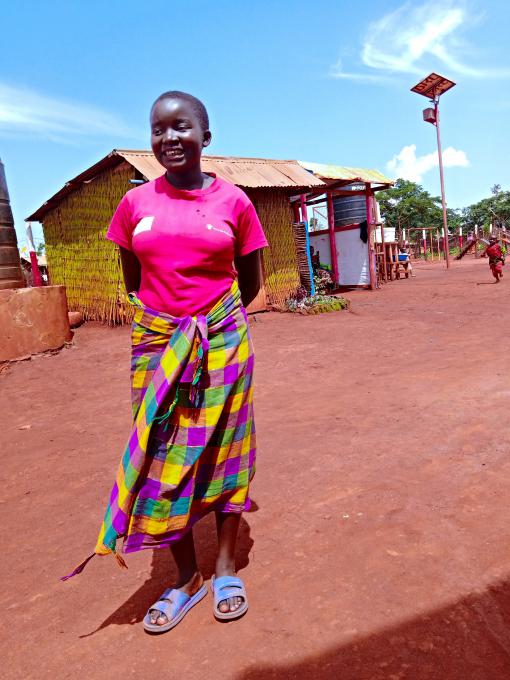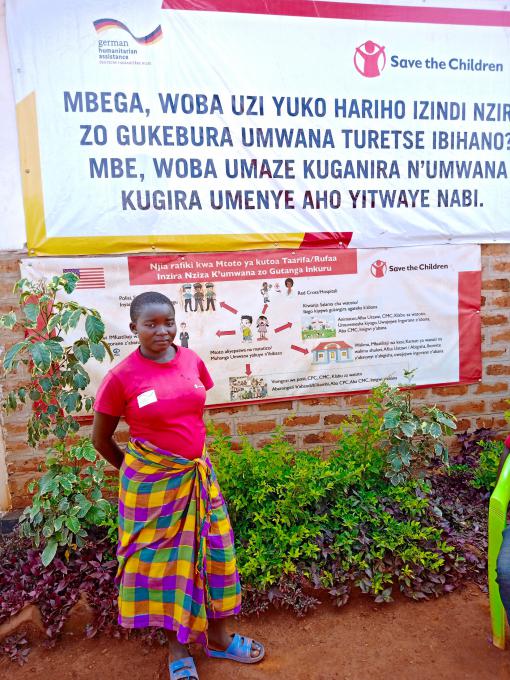Building a Safe Space for Adolescents and Youths in Refugee Camps: Kezimana’s Story

Kezimana is a 16-years-old refugee girl living with her parents and six siblings at Zone 10 in Nyarugusu camp. She moved to Tanzania in 2015 following the war in Burundi. For a long time, Kezimana had an estranged relationship with her parents because of her involvement in a bad company, which hurt her parents emotionally. At 13 Kezimana started going out with a group of adolescents who were drinking, dropped out of school, and skipped out of the camp to seek paid jobs in towns.
Kezimana’s family was worried as her actions were exposing her to child protection risks considering her age. She says that she did not listen to her parents because she thought she was denied her right to play with her peers. At her age, Kezimana had not attended a life skills session. Hence, she did not have the right information about the right group to associate with as she was growing.
In October 2021, Kezimana met Niyungeko Ezekiel- a life skills facilitator at Zawadi Child-Friendly space. He introduced her to the program and had her registered. It has been six months now since Kezimana joined the program and there have been some visible changes in her lifestyle. First, Kezimana started going to school again and stayed away from the bad company. She helps with the household chores including fetching water, washing her siblings’ clothes, and cooking. She is working on rebuilding her relationship with her family.
Kezimana says that she is grateful to be part of the Zawadi Child-Friendly Space. “I am grateful for the life skills sessions and learning provided by Save the Children. They have taught me some positive coping mechanism-which I initially struggled with. I now understand and carefully observe my attitude towards my family and elders and I know why I must stay in school. With this learning, I am going to be a very good ambassador for this program”

Her life skills facilitator Mr Niyungeko Ezekieli equally praises Kezimana’s efforts in turning her life around and what Zawadi Child-Friendly Space offers to children and young people like her “The life skills sessions at the Zawadi Child-Friendly Space introduce adolescents and youth to a specific set of skills required to transition from one level of growth to another. Skills such as self-awareness, decision-making, communication skills, and how to resist peer pressure are among the key components of these sessions. The space also provides these young people with knowledge on HIV/AIDS, hygiene, sexual reproductive health and rights, and gender. We aim to build their self-esteem and provide them with tools to cope with everyday adolescent challenges. Kezimana is my student and I can see the change in her behaviour and attitude. She is now back to school and she appreciates the importance of education after several months of absence”
Vastine is Kezimana’s close friend. She explains the change she sees in her friends’ behavior after she joined the program. ‘It is quite true that Kezimana’s attitude towards life has changed greatly since she started attending life skills sessions at Zawadi Child-Friendly Spaces. She has now become a good advisor to me and other young people in our place. She has been telling me why I should choose my friends carefully, why I should never drop out of school and how I can be confident as a girl.’
Zawadi Child-Friendly Space (CFS) is one of the 6 safe places for children in Nyarugusu camp. The space provides children aged 13-17 with life skills including problem-solving and thinking skills, managing emotions, and resisting peer pressure. The space also organizes one-on-one counseling for youths. The aim of the sessions is to empower the youths with life skills that will enable them to identify positive life coping mechanisms, hence becoming good citizens and ambassadors of good behavior. The space is equipped with a child-friendly playground which gives children and young people a safe environment and opportunity to play and meet with their peers.
Peer-to-peer sessions are provided to adolescents and youths aged 13-17 in Nduta camp, with the aim of unveiling the challenges they face in their growth and how to avoid them. They get a chance to learn how to identify good and bad peer groups, learn how to respect older people, how to behave better, and also learn how to socialize with their peers.
 Tanzania
Tanzania